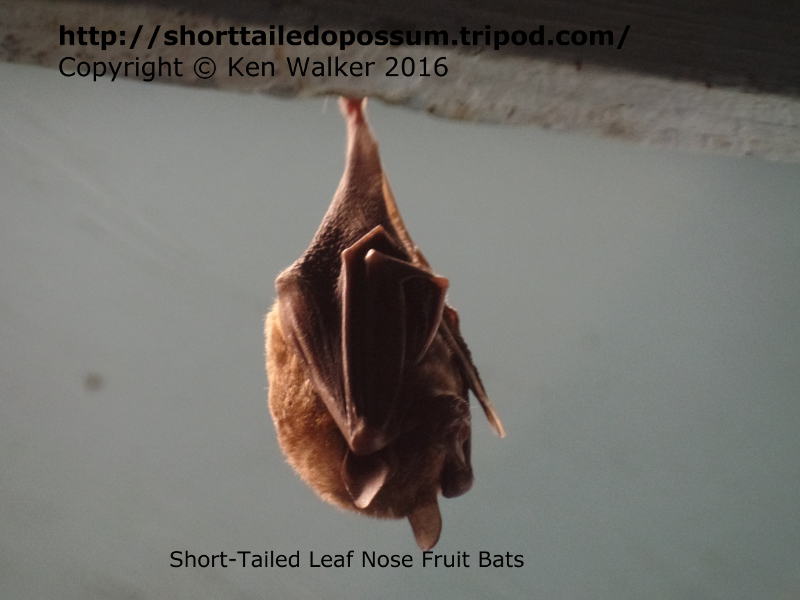 |
 |
 |
 |
 |
 |
 |
 |
|||
Seba's Short-Tailed Leaf Nose Fruit Bats (Carollia perspicillata)

From time to time, I will offer captive born bats ( I no longer sell animals, but this care sheet will remain up to help bat owners), one of the more common species available that thrive under captive conditions are Short Tailed Leaf Nose Fruit Bats. These are a small bat, around 3 inches from head to rump. These are one of the most common species used in labs, and will readily reproduce under proper conditions. House your bats in an indoor flight cage, a simple bird cage WILL NOT SUFFICE for this or most other species of bat (with the exception of Vampire Bats). Construct a flight cage constructed from materials that will not damage the sensitive membranes and toes from life threatening abrasions and don't half ass this guys, you're resposible for the proper care of these animals.
Cleaning can be a bit of a chore if your housing is not set up properly (thus allowing bats to defecate on all parts of the enclosure). Build your enclosure from plastic or glass panels, using wire on the top of the flight cage… this will prevent your bats from being able to climb on the walls, thus eliminating the need to scrub dried droppings from the sides of the cage making maintenance minimal. The Short-Tailed Leaf Nose Fruit Bat is extremely sensitive to the use of harsh chemicals (is it any wonder that bats are on the decline, look at what our farmers are spraying on crops these days), thus use diluted, weak solutions of bleach for cleaning. Ensure that you get all residue removed from surfaces.
I would recommend keeping a humidity of around 50%.
Feeding your Bat
Diet will consist of fruit supplemented with Zupreem primate biscuits,
Roudybush Lory Nectar and Lubee Fruit Bat Supplement. Mix your fruit,
biscuit and supplement into a fruit smoothie for early morning, and offer
soft fruits and veggies (cook harder foods to soften) for night feedings,
leaving nectar free feed during the day as well. Avoid feeding citrus
and grapes. An exact diet brake down will be provided for paying customers,
other words, copied to you upon purchase, please do not ask otherwise.
If you are purchasing bats from non USDA licensed dealers, think twice. These are heavily regulated exotic animals. It is illegal to buy or sell these with out being USDA licensed, and any bat species that is wild caught will also be regulated by the CDC (not a can of worms you want to open). Please note, without the paper work provided by a licensed dealer, you will not have proof that your bats are captive born… do you really want your animals seized or risk buying unregulated animals?
I am only selling larger groups of these bats, bats are highly social animals and live in colonies numbering in the thousands in the wild. They do well in groups, but do not overcrowd them in a too small of an enclosure. I am mainly selling for education outreach, zoo's, schools, retail display animals or any person that has a greater plan for these animals other than just trying to make simple pets out of them… these are not hamsters folks... if you have to ask why you would want a bat… then they are not for you.
Shipping
I'm seeing higher shipping costs with bats due to specialized crating
being required. I hire out my custom crates, thus increasing shipping
costs. I can usually drive these to a buyer cheaper than I can ship them.
Please note, if you are having your bats shipped via UPS, Fedex or USPS
this is illegal (only legal for reptiles and fowl), and I would steer
clear of this. This is not an animal to buy from questionable sources,
make sure you are getting a healthy animal, get a health certificate,
get it from a properly USDA licensed dealer or breeder and get only captive
born animals. Play by the rules and keep the hobby safe for all of us!
<--- Back to Exotic Animal Care Sheets
|
Links
|
About Exotic Pets | ||||||||